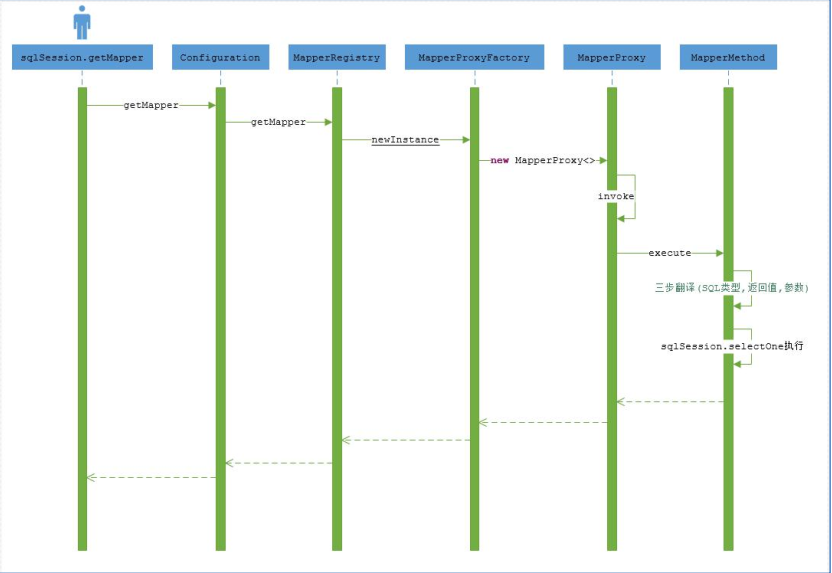MyBatis中binding 模块的作用是什么,很多新手对此不是很清楚,为了帮助大家解决这个难题,下面小编将为大家详细讲解,有这方面需求的人可以来学习下,希望你能有所收获。
org.apache.ibatis.binding
封装ibatis编程模型 ibatis编程模型中,SqlSession作为sql执行的入口,实用方法为sqlSession.selectOne(namespace+id, 参数列表)的形式(例:sqlSession.selectOne("com.enjoylearning.mybatis.mapper.TUserMapper.selectByPrimaryKey", 2)),不易于维护和阅读
找到SqlSession中对应的方法(insert|update|select)
找到命名空间和方法名(两维坐标)
传递参数
MapperRegistry:mapper接口和对应的代理工厂的注册中心;是Configuration的成员变量
MapperProxyFactory:用于生成mapper接口动态代理的实例对象;保证mapper实例对象是局部变量(为什么不缓存?见文章最后)
MapperMethod:封装了Mapper接口中对应的方法信息,以继对应sql语句的信息.MapperMethod对象不记录任何状态,所以它可以再多个代理对象之间共享;sqlCommand:封装sql语句;MtehodSignature:封装mapper接口的入参和返回类型
个人理解
MapperRegistry的Map<Class<?>, MapperProxyFactory<?>> knownMappers = new HashMap<>(); key:mapper的Class对象 value:生产这个mapper的动态代理示例的工厂
MapperProxyFactory:Map<Method, MapperMethod> methodCache key:方法的反射类 value 方法的信息(sql语句,入参,返回值)
public class MapperRegistry {
private final Configuration config;//config对象,mybatis全局唯一的
//记录了mapper接口与对应MapperProxyFactory之间的关系
private final Map<Class<?>, MapperProxyFactory<?>> knownMappers = new HashMap<>();
public MapperRegistry(Configuration config) {
this.config = config;
}
@SuppressWarnings("unchecked")
public <T> T getMapper(Class<T> type, SqlSession sqlSession) {
final MapperProxyFactory<T> mapperProxyFactory = (MapperProxyFactory<T>) knownMappers.get(type);
if (mapperProxyFactory == null) {
throw new BindingException("Type " + type + " is not known to the MapperRegistry.");
}
try {
return mapperProxyFactory.newInstance(sqlSession);
} catch (Exception e) {
throw new BindingException("Error getting mapper instance. Cause: " + e, e);
}/**
*
* 用于生成mapper接口动态代理的实例对象;
* @author Lasse Voss
*/
public class MapperProxyFactory<T> {
//mapper接口的class对象
private final Class<T> mapperInterface;
//key是mapper接口中的某个方法的method对象,value是对应的MapperMethod,MapperMethod对象不记录任何状态信息,所以它可以在多个代理对象之间共享
private final Map<Method, MapperMethod> methodCache = new ConcurrentHashMap<>();public class MapperMethod {
//从configuration中获取方法的命名空间.方法名以及SQL语句的类型
private final SqlCommand command;
//封装mapper接口方法的相关信息(入参,返回类型);
private final MethodSignature method;
public class MapperProxyFactory<T> {
//mapper接口的class对象
private final Class<T> mapperInterface;
//key是mapper接口中的某个方法的method对象,value是对应的MapperMethod,MapperMethod对象不记录任何状态信息,所以它可以在多个代理对象之间共享
private final Map<Method, MapperMethod> methodCache = new ConcurrentHashMap<>();
public MapperProxyFactory(Class<T> mapperInterface) {
this.mapperInterface = mapperInterface;
}
public Class<T> getMapperInterface() {
return mapperInterface;
}
public Map<Method, MapperMethod> getMethodCache() {
return methodCache;
}
@SuppressWarnings("unchecked")
protected T newInstance(MapperProxy<T> mapperProxy) {
//创建实现了mapper接口的动态代理对象
return (T) Proxy.newProxyInstance(mapperInterface.getClassLoader(), new Class[] { mapperInterface }, mapperProxy);
}
public T newInstance(SqlSession sqlSession) {
//每次调用都会创建新的MapperProxy对象
final MapperProxy<T> mapperProxy = new MapperProxy<>(sqlSession, mapperInterface, methodCache);
return newInstance(mapperProxy);
}
}两个newInstance方法生成mapper的动态代理对象MapperProxy
public class MapperProxy<T> implements InvocationHandler, Serializable {
.......
@Override
public Object invoke(Object proxy, Method method, Object[] args) throws Throwable {
try {
if (Object.class.equals(method.getDeclaringClass())) {//如果是Object本身的方法不增强
return method.invoke(this, args);
} else if (isDefaultMethod(method)) {
return invokeDefaultMethod(proxy, method, args);
}
} catch (Throwable t) {
throw ExceptionUtil.unwrapThrowable(t);
}
//从缓存中获取mapperMethod对象,如果缓存中没有,则创建一个,并添加到缓存中
final MapperMethod mapperMethod = cachedMapperMethod(method);
//调用execute方法执行sql
return mapperMethod.execute(sqlSession, args);
}
private MapperMethod cachedMapperMethod(Method method) {
return methodCache.computeIfAbsent(method, k -> new MapperMethod(mapperInterface, method, sqlSession.getConfiguration()));
}从invoke方法可以看出 是mapperMethod调用了execute方法
public class MapperMethod {
......
public Object execute(SqlSession sqlSession, Object[] args) {
Object result;
//根据sql语句类型以及接口返回的参数选择调用不同的
switch (command.getType()) {
case INSERT: {
Object param = method.convertArgsToSqlCommandParam(args);
result = rowCountResult(sqlSession.insert(command.getName(), param));
break;
}
case UPDATE: {
Object param = method.convertArgsToSqlCommandParam(args);
result = rowCountResult(sqlSession.update(command.getName(), param));
break;
}
case DELETE: {
Object param = method.convertArgsToSqlCommandParam(args);
result = rowCountResult(sqlSession.delete(command.getName(), param));
break;
}
case SELECT:
if (method.returnsVoid() && method.hasResultHandler()) {//返回值为void
executeWithResultHandler(sqlSession, args);
result = null;
} else if (method.returnsMany()) {//返回值为集合或者数组
result = executeForMany(sqlSession, args);
} else if (method.returnsMap()) {//返回值为map
result = executeForMap(sqlSession, args);
} else if (method.returnsCursor()) {//返回值为游标
result = executeForCursor(sqlSession, args);
} else {//处理返回为单一对象的情况
//通过参数解析器解析解析参数
Object param = method.convertArgsToSqlCommandParam(args);
result = sqlSession.selectOne(command.getName(), param);
if (method.returnsOptional() &&
(result == null || !method.getReturnType().equals(result.getClass()))) {
result = OptionalUtil.ofNullable(result);
}
}
break;
case FLUSH:
result = sqlSession.flushStatements();
break;
default:
throw new BindingException("Unknown execution method for: " + command.getName());
}
if (result == null && method.getReturnType().isPrimitive() && !method.returnsVoid()) {
throw new BindingException("Mapper method '" + command.getName()
+ " attempted to return null from a method with a primitive return type (" + method.getReturnType() + ").");
}
return result;
}重点看 result = sqlSession.selectOne(command.getName(), param); 这里使用了ibatis的用法
mapperProxy做查询依赖的还是sqlSession.按照现在的代码结构来说,如果缓存了mapperProxy,当sqlSession失效,mapperProxy也就失效了. 如果修改代结构,那么sqlSession就要作为查询参数
// 原本
TUser user = mapper.selectByPrimaryKey(2);
// 修改后的写法
TUser user = mapper.selectByPrimaryKey(sqslSession,2);看完上述内容是否对您有帮助呢?如果还想对相关知识有进一步的了解或阅读更多相关文章,请关注亿速云行业资讯频道,感谢您对亿速云的支持。
亿速云「云服务器」,即开即用、新一代英特尔至强铂金CPU、三副本存储NVMe SSD云盘,价格低至29元/月。点击查看>>
免责声明:本站发布的内容(图片、视频和文字)以原创、转载和分享为主,文章观点不代表本网站立场,如果涉及侵权请联系站长邮箱:is@yisu.com进行举报,并提供相关证据,一经查实,将立刻删除涉嫌侵权内容。
原文链接:https://my.oschina.net/hongyanluori/blog/3120803